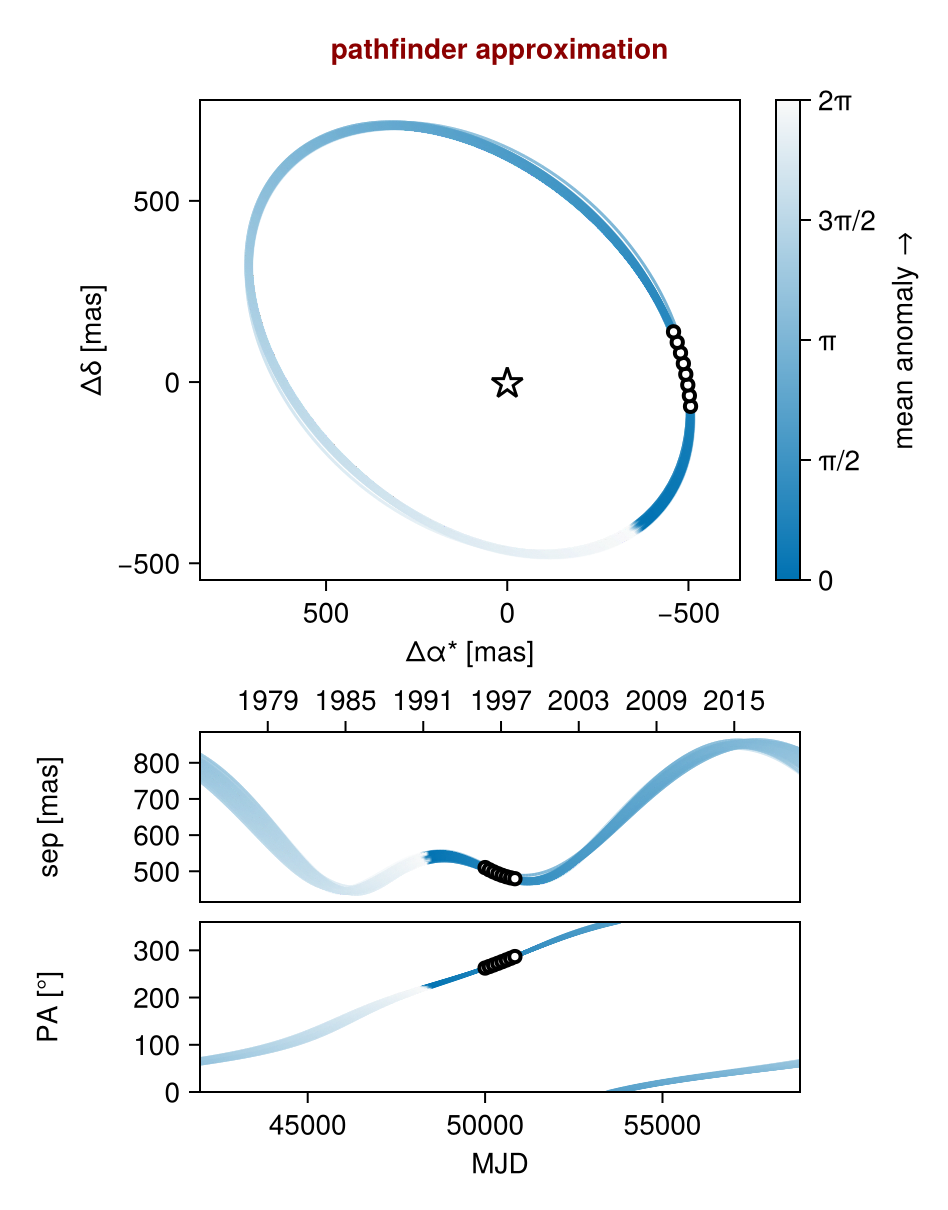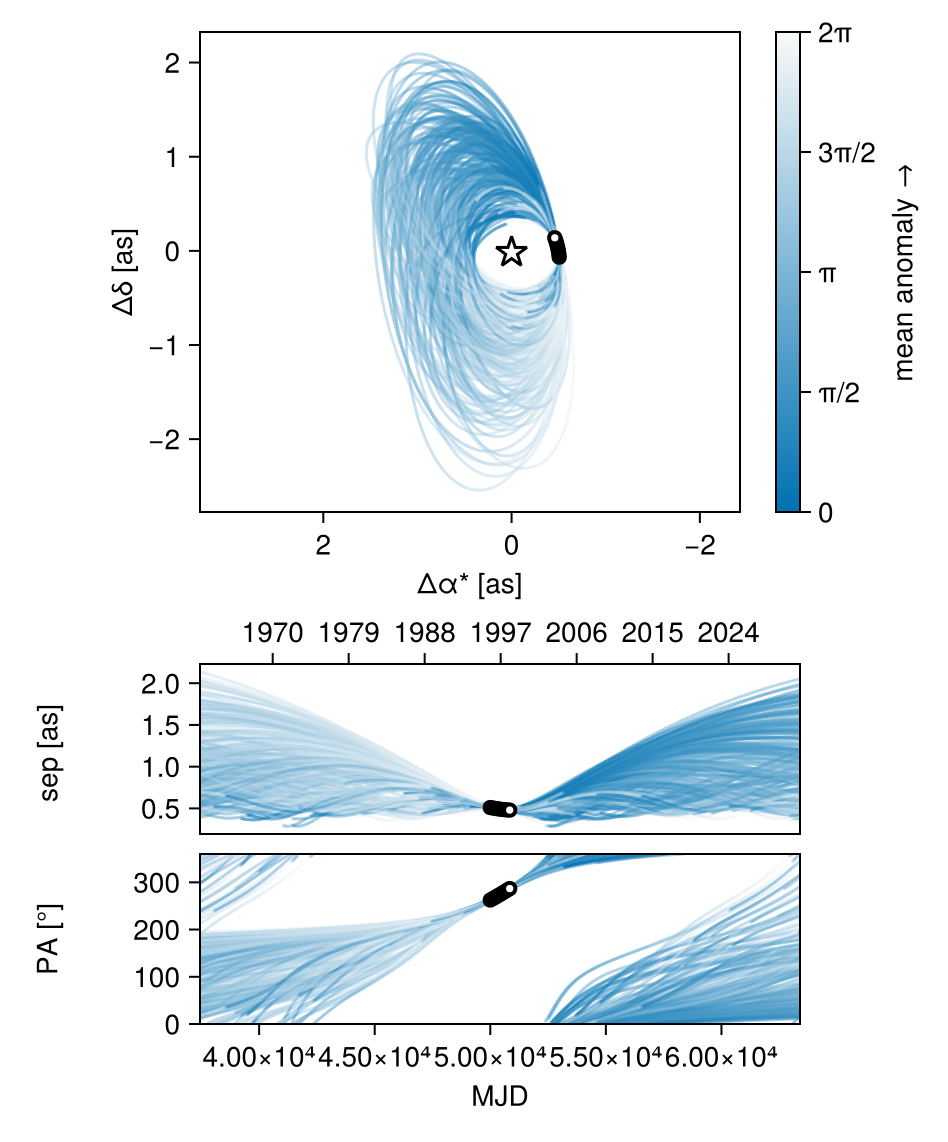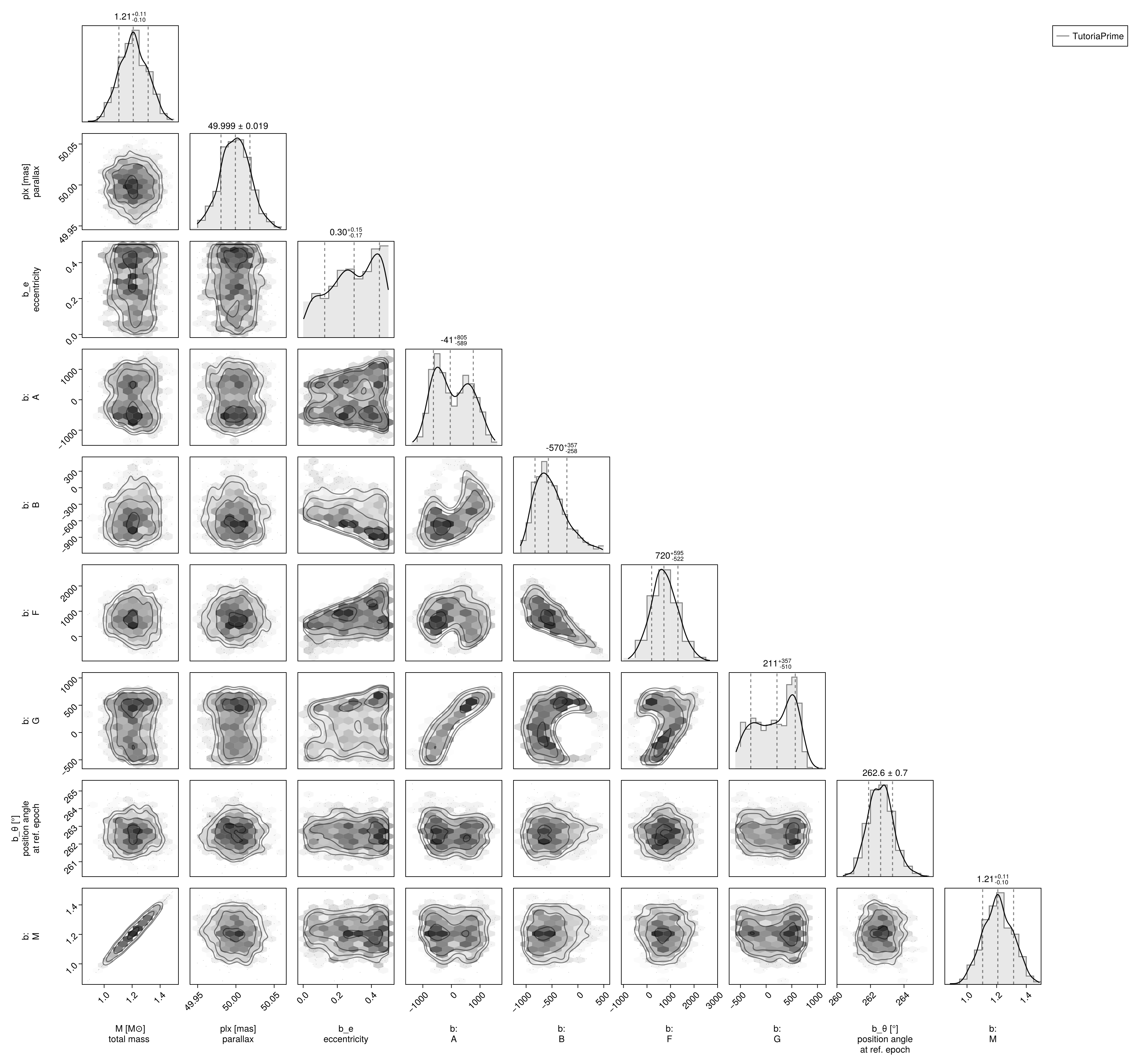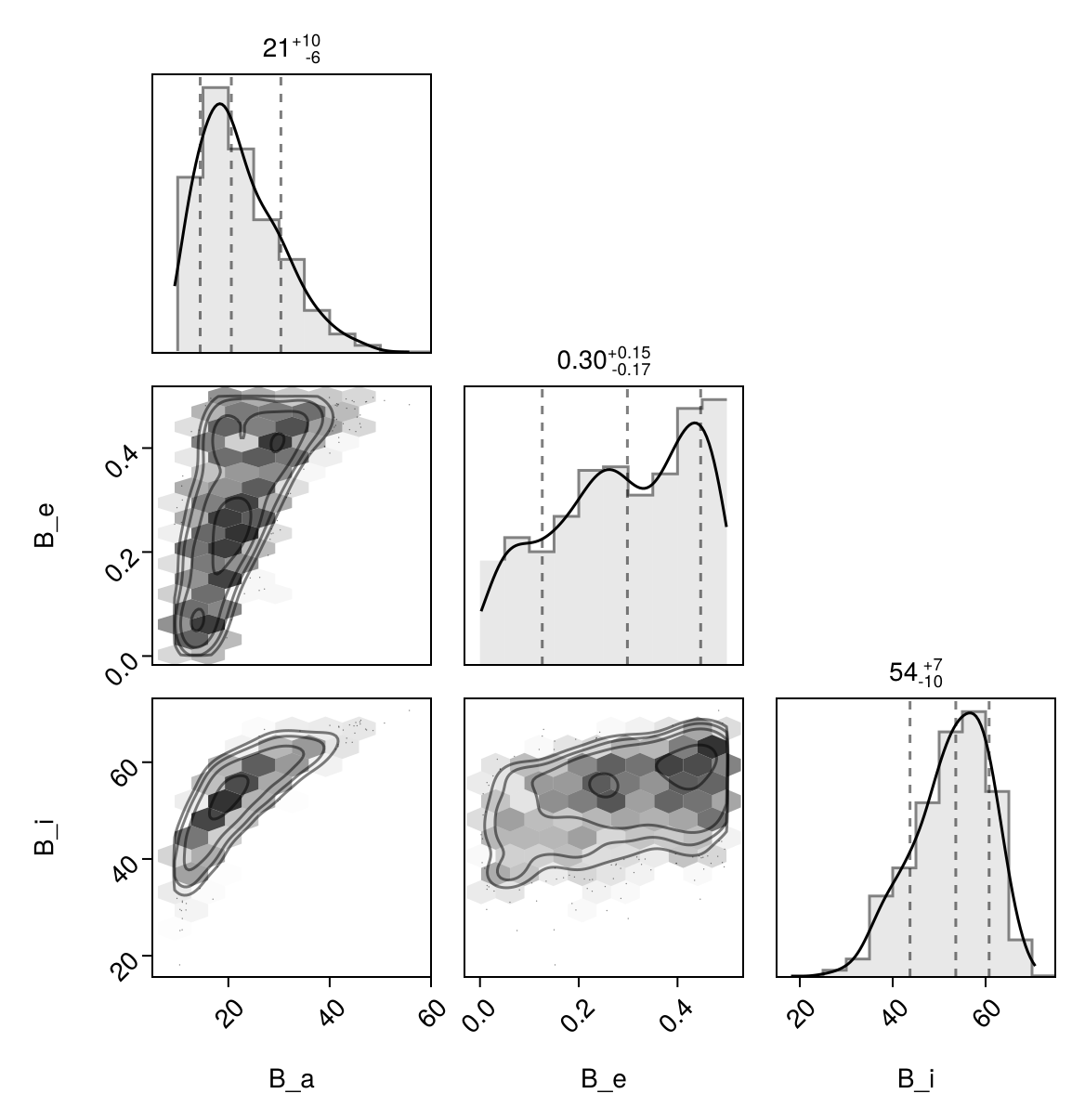Fit with a Thiele-Innes Basis
This example shows how to fit relative astrometry using a Thiele-Innes orbital basis instead of the traditional Campbell basis used in other tutorials. The Thiele-Innes basis is more suitable then Campbell for fitting low-eccentricity orbits, because it does not have the issues where ω, Ω, and tp become degenerate as eccentricity and/or inclination fall to zero.
At the end, we will convert our results back into the Campbell basis to compare.
using Octofitter
using CairoMakie
using PairPlots
using Distributions
astrom_dat = Table(;
epoch = [50000, 50120, 50240, 50360, 50480, 50600, 50720, 50840],
ra = [-505.7637580573554, -502.570356287689, -498.2089148883798, -492.67768482682357, -485.9770335870402, -478.1095526888573, -469.0801731788123, -458.89628893460525],
dec = [-66.92982418533026, -37.47217527025044, -7.927548139010479, 21.63557115669823, 51.147204404903704, 80.53589069730698, 109.72870493064629, 138.65128697876773],
σ_ra = [10, 10, 10, 10, 10, 10, 10, 10],
σ_dec = [10, 10, 10, 10, 10, 10, 10, 10],
cor = [0, 0, 0, 0, 0, 0, 0, 0]
)
astrom_like = PlanetRelAstromLikelihood(
astrom_dat,
name = "GPI",
variables = @variables begin
# Fixed values for this example - could be free variables:
jitter = 0 # mas [could use: jitter ~ Uniform(0, 10)]
northangle = 0 # radians [could use: northangle ~ Normal(0, deg2rad(1))]
platescale = 1 # relative [could use: platescale ~ truncated(Normal(1, 0.01), lower=0)]
end
)
planet_b = Planet(
name="b",
basis=ThieleInnesOrbit,
likelihoods=[astrom_like],
variables=@variables begin
e ~ Uniform(0.0, 0.5)
A ~ Normal(0, 1000) # milliarcseconds
B ~ Normal(0, 1000) # milliarcseconds
F ~ Normal(0, 1000) # milliarcseconds
G ~ Normal(0, 1000) # milliarcseconds
M = system.M
θ ~ UniformCircular()
tp = θ_at_epoch_to_tperi(θ, 50000.0; system.plx, M, e, A, B, F, G) # reference epoch for θ. Choose an MJD date near your data.
end
)
sys = System(
name="TutoriaPrime",
companions=[planet_b],
likelihoods=[],
variables=@variables begin
M ~ truncated(Normal(1.2, 0.1), lower=0.1)
plx ~ truncated(Normal(50.0, 0.02), lower=0.1)
end
)
model = Octofitter.LogDensityModel(sys)LogDensityModel for System TutoriaPrime of dimension 9 and 9 epochs with fields .ℓπcallback and .∇ℓπcallback
Initialize the starting points, and confirm the data are entered correcly:
init_chain = initialize!(model)
octoplot(model, init_chain)
We now sample from the model as usual:
results = octofit(model)Chains MCMC chain (1000×28×1 Array{Float64, 3}):
Iterations = 1:1:1000
Number of chains = 1
Samples per chain = 1000
Wall duration = 5.93 seconds
Compute duration = 5.93 seconds
parameters = M, plx, b_e, b_A, b_B, b_F, b_G, b_θx, b_θy, b_θ, b_M, b_tp, b_GPI_jitter, b_GPI_northangle, b_GPI_platescale
internals = n_steps, is_accept, acceptance_rate, hamiltonian_energy, hamiltonian_energy_error, max_hamiltonian_energy_error, tree_depth, numerical_error, step_size, nom_step_size, is_adapt, loglike, logpost, tree_depth, numerical_error
Summary Statistics
parameters mean std mcse ess_bulk ess_tail ⋯
Symbol Float64 Float64 Float64 Float64 Float64 ⋯
M 1.2093 0.1006 0.0041 605.4687 503.4560 ⋯
plx 49.9992 0.0196 0.0007 812.7774 490.3898 ⋯
b_e 0.2910 0.1404 0.0062 519.6361 605.4305 ⋯
b_A 44.0218 632.5368 47.8796 184.0012 308.8855 ⋯
b_B -516.5600 315.2948 24.6555 196.5038 232.9641 ⋯
b_F 742.7807 561.4974 45.1048 151.1392 308.1562 ⋯
b_G 163.6639 380.8540 28.4828 196.0964 420.1776 ⋯
b_θx -0.1297 0.0192 0.0008 620.9341 558.5930 ⋯
b_θy -0.9999 0.1000 0.0037 738.8254 546.0207 ⋯
b_θ -1.6996 0.0130 0.0005 606.8835 445.5038 ⋯
b_M 1.2093 0.1006 0.0041 605.4687 503.4560 ⋯
b_tp 30339.9234 23674.9524 1410.4102 341.4213 380.1178 ⋯
b_GPI_jitter 0.0000 0.0000 NaN NaN NaN ⋯
b_GPI_northangle 0.0000 0.0000 NaN NaN NaN ⋯
b_GPI_platescale 1.0000 0.0000 NaN NaN NaN ⋯
2 columns omitted
Quantiles
parameters 2.5% 25.0% 50.0% 75.0% ⋯
Symbol Float64 Float64 Float64 Float64 F ⋯
M 1.0169 1.1383 1.2079 1.2822 ⋯
plx 49.9602 49.9856 49.9993 50.0125 5 ⋯
b_e 0.0264 0.1855 0.2985 0.4183 ⋯
b_A -923.5428 -509.1384 -40.9763 581.1510 116 ⋯
b_B -973.1430 -748.6135 -569.6612 -346.1234 24 ⋯
b_F -318.6783 384.9358 719.9969 1099.5475 190 ⋯
b_G -514.2538 -178.3602 211.0709 505.1457 70 ⋯
b_θx -0.1706 -0.1415 -0.1292 -0.1158 - ⋯
b_θy -1.2064 -1.0677 -0.9952 -0.9287 - ⋯
b_θ -1.7226 -1.7087 -1.6999 -1.6914 - ⋯
b_M 1.0169 1.1383 1.2079 1.2822 ⋯
b_tp -31376.4192 18016.5528 40063.4993 48540.2505 4976 ⋯
b_GPI_jitter 0.0000 0.0000 0.0000 0.0000 ⋯
b_GPI_northangle 0.0000 0.0000 0.0000 0.0000 ⋯
b_GPI_platescale 1.0000 1.0000 1.0000 1.0000 ⋯
1 column omitted
Notice that the fit was very very fast! The Thiele-Innes orbital paramterization is easier to explore than the default Campbell in many cases.
We now display the results:
octoplot(model,results)
octocorner(model, results, small=false)
Conversion back to Campbell Elements
To convert our chain into the more familiar Campbell parameterization, we have to do a few steps. We start by turning the chain table into a an array of orbit objects, and then convert their type:
orbits_ti = Octofitter.construct_elements(model, results, :b, :) # colon means all rows1000-element Vector{ThieleInnesOrbit{Float64}}:
ThieleInnesOrbit{Float64}(0.24114866491057388, 29403.72472838958, 1.2455147077757607, 49.95128688435789, 788.8336039429025, -262.0187643484763, 356.9593404230577, 508.0191994505008, 4.915176674820727, -12.10623280140728, 23654.68765804608, 0.09701812455201572, 1.278891058474485)
ThieleInnesOrbit{Float64}(0.4568592605637595, 4727.849900030982, 1.332491484231123, 49.95236364447514, 1211.6556760610572, -341.90647545811873, 752.6019001539516, 714.5589880357832, -13.581555664296436, 19.69894768230192, 48472.60741956658, 0.047344955339063625, 1.6377688620041835)
ThieleInnesOrbit{Float64}(0.4537402499069735, 49120.07855616792, 1.065095876874362, 50.029779264743766, -509.6395612365742, -933.8418270810007, 814.9910685331353, -165.55392515551566, -6.956604472380784, -14.975132801486142, 37454.54258567388, 0.0612724992755656, 1.6313374515235572)
ThieleInnesOrbit{Float64}(0.4129988480614527, 49896.226642049805, 1.0627277607907768, 50.01120669701405, -154.55497925110402, -839.8031314174071, 592.4332133200999, -102.76833458665106, -0.1733955555075377, -12.124826223227267, 24999.745423348362, 0.09179827212576351, 1.551498739705961)
ThieleInnesOrbit{Float64}(0.46284936808342236, 48815.161549291, 1.0799119326901607, 50.01114658443287, -630.9182324885733, -875.9775609595908, 703.3441669691937, -313.8256715382573, -4.29360819951474, -15.72320028618697, 36290.866538188595, 0.06323721785569389, 1.6502576654514964)
ThieleInnesOrbit{Float64}(0.4137839479039797, 48682.33101311054, 1.087458578164918, 49.98895665429712, -619.7957321330287, -895.0968311173378, 1092.3473418883962, -76.08113676456769, -15.698097561715494, -15.522933496816743, 48724.021136599215, 0.0471006575383717, 1.5529685833310245)
ThieleInnesOrbit{Float64}(0.22306594827936096, 48913.35772004048, 1.4304537258077072, 49.99404933504282, -468.8648355258894, -621.0228747751554, 897.2692500491453, -155.16476051657236, -13.490981098337008, -9.618702924300633, 28548.937786524486, 0.0803859481780995, 1.254679665235274)
ThieleInnesOrbit{Float64}(0.38504255853303443, 48583.97441028858, 1.0823557927289056, 50.00318620201535, -565.1107167855997, -938.1474580600539, 1252.7344883056562, 166.9362828879431, -20.840869582021988, -16.59113803606729, 58364.34875237033, 0.039320809406858, 1.5007523377854524)
ThieleInnesOrbit{Float64}(0.45217183358312557, 46943.802738684935, 1.3571934862096982, 49.999118825373586, -1242.9787013031612, -880.342740298963, 871.4029411984403, -325.58626455596055, -11.854278841282369, -26.87758159648409, 58597.03334973959, 0.03916466930586585, 1.628121553513892)
ThieleInnesOrbit{Float64}(0.3147394784246087, 3931.5235071328643, 1.1726286712175615, 49.985050365734885, 65.85092738457612, -697.4369780909825, 1269.2987565820192, 379.8972217180148, -22.72403848939326, -3.1944739985506714, 46531.227138411516, 0.049320286065545796, 1.385134656947846)
⋮
ThieleInnesOrbit{Float64}(0.4106450137151641, 49100.93751831243, 1.0911072171992084, 49.99409673480623, -445.4861128972526, -792.8406052792428, 569.8977621441844, -269.3327462314166, -1.2256565569569118, -13.169473644218101, 27221.524249270096, 0.08430583873380562, 1.5471071310123297)
ThieleInnesOrbit{Float64}(0.41248885696109866, 48806.89197927719, 1.079166893557902, 50.03412947324056, -517.3987985323494, -786.2858251558375, 510.8281668015004, -318.4580266430267, -0.3838755595600431, -14.467070589258697, 28697.62616196478, 0.0799694518457767, 1.550545308041463)
ThieleInnesOrbit{Float64}(0.04468143413825885, 44486.49030418944, 1.3433024196059613, 49.96902265338312, -902.3755160980788, -173.33939965422925, 24.010321794641435, -490.88559801551895, 1.625937192012877, -15.622288338935418, 24996.5621067155, 0.09180996265205582, 1.045725815142836)
ThieleInnesOrbit{Float64}(0.48549601823886945, 49066.09096070463, 1.114772709467992, 50.02105779100882, -538.4937534835408, -901.5171990345531, 649.1408920682593, -317.2908458749223, -1.6565860041906457, -15.32348937288309, 33430.550480081634, 0.06864779073305106, 1.699187779412098)
ThieleInnesOrbit{Float64}(0.19790804374152907, 45933.28111543249, 1.3714353694557306, 49.9937764766383, -837.5440069488465, -225.45600883928802, 0.025661078375257773, -518.82087137388, 3.2757990933465986, -14.28401515152966, 23139.002716806466, 0.09918030874254029, 1.22208006568898)
ThieleInnesOrbit{Float64}(0.46482712022815714, 48821.562177002364, 1.0979255913866341, 50.00338172703536, -644.4593925100303, -926.7720422660256, 813.6897030767583, -218.56502991830902, -7.637196514060883, -16.85364427979508, 40555.097227505765, 0.056588039243827694, 1.6544213937601533)
ThieleInnesOrbit{Float64}(0.41843517591562635, 48168.22820522976, 1.2153336981206821, 50.000034844054795, -832.7037485550725, -889.0854155117371, 1400.5594870632628, -98.11317174554465, -23.236610928816273, -18.57445811341379, 64723.64341052301, 0.035457420387960195, 1.5617290229331637)
ThieleInnesOrbit{Float64}(0.4798516583800818, -5621.163928468872, 1.1365929424135295, 49.97030374213769, 499.6386269267906, -793.2917887390207, 1368.8962578904404, 613.897653915194, -23.6742714085268, 3.3316782621765686, 56880.0109291954, 0.0403469232153294, 1.686729663501245)
ThieleInnesOrbit{Float64}(0.45134814574935855, -7051.51621200089, 1.1583096504941743, 50.0169278928235, 59.08681005033855, -902.4947304233606, 1510.8188832545864, 226.4346260344827, -24.686144770871408, -1.863534417262788, 57448.01319912853, 0.039948003519156644, 1.6264374868322444)Here is one of those entries:
display(orbits_ti[1])We can now make a table of results (and visualize them in a corner plot) by querying properties of these objects:
table = (;
B_a = semimajoraxis.(orbits_ti),
B_e = eccentricity.(orbits_ti),
B_i = rad2deg.(inclination.(orbits_ti)),
)
pairplot(table)
We can also convert the orbit objects into Campbell parameters:
orbits_campbell = Visual{KepOrbit}.(orbits_ti)
orbits_campbell[1]KepOrbit{Float64}
─────────────────────────
a [au ] = 17.4
e = 0.24114866
i [° ] = 48.9
ω [° ] = 518.0
Ω [° ] = 177.0
tp [day] = 29400.0
M [M⊙ ] = 1.25
period [yrs ] : 64.8
mean motion [°/yr] : 5.56
──────────────────────────
plx [mas] = 50.0
distance [pc ] : 20.0
──────────────────────────